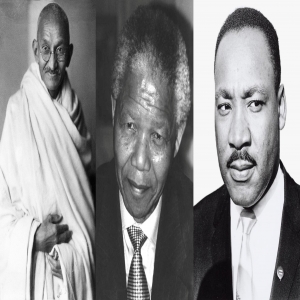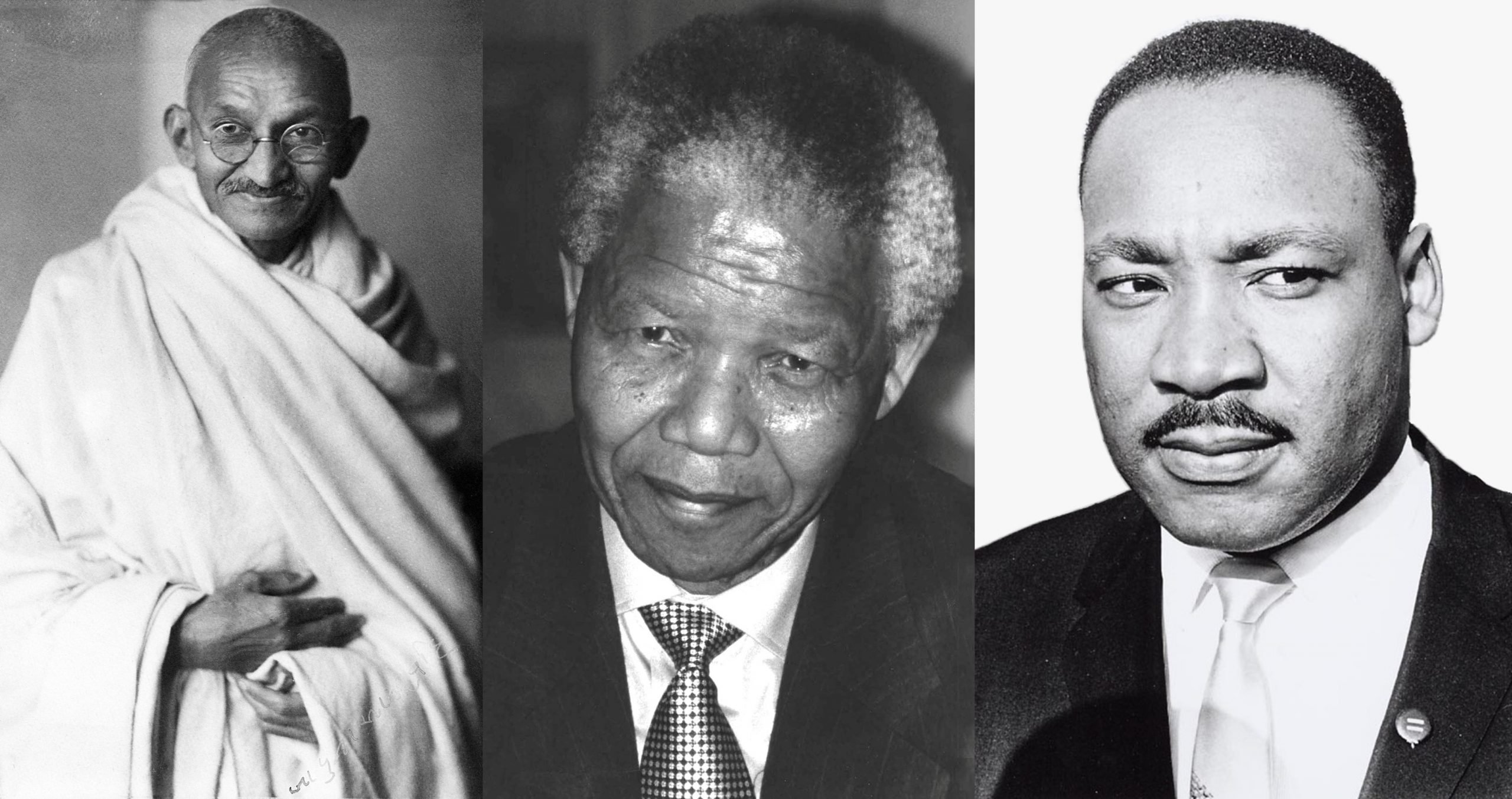
.png) Jacob Peenikaparambil
Jacob Peenikaparambil

Historically, the world has witnessed the profound impact of leadership in shaping nations and societies. Figures such as Mahatma Gandhi, Martin Luther King Jr, and Nelson Mandela epitomise leaders with strong vision, a deep sense of purpose, and the ability to inspire collective action. Their transformative leadership styles resulted in significant societal changes: India's independence, the U.S. civil rights movement, and the end of apartheid in South Africa, respectively.
Conversely, history also provides cautionary tales of destructive leadership. Dictators like Adolf Hitler, Joseph Stalin, and Pol Pot wielded power to catastrophic ends, resulting in devastating wars, genocides, and widespread human rights abuses.
In today's world, increasing hate speech, violence, conflicts, and wars in various regions underscore the poverty of enlightened leadership. Leaders across nations often seem to lack the vision, imagination, and collective purpose essential for effectively guiding their countries. In an interconnected world, many political leaders appear narrow-minded, exclusive, and divisive. Instead of exploring non-violent solutions to conflicts, they frequently resort to retaliation, violence, or full-scale wars, as evidenced by the Ukraine-Russia conflict and the ongoing clashes between Israel and Hamas in Palestine.
The war between Ukraine and Russia has inflicted colossal damage on both nations and adversely impacted global economies. According to a report by The Wall Street Journal, over one million people have been killed or wounded. The World Bank estimates that the war has caused $152 billion in direct damage to Ukraine's infrastructure, with the UN projecting $486 billion for recovery. The conflict has also escalated global food prices, exacerbating hunger worldwide. Similarly, the wars between Israel and Hamas, as well as Israel and Hezbollah, have resulted in immense suffering, particularly for women and children.
These conflicts stem predominantly from the pride, ambition, and egos of leaders rather than genuine concerns for their people. War affects not only the present generation but also leaves a lasting impact on future generations.
India is no exception to the global leadership crisis. The country suffers from a lack of enlightened leaders who possess wisdom, sensitivity, and respect for diversity. Many current political and religious leaders fail to understand or emulate the noble ideas of great Indian luminaries such as Raja Ram Mohan Roy, Gopal Krishna Gokhale, Rabindranath Tagore, Mahatma Gandhi, Pandit Jawaharlal Nehru, Sardar Vallabhbhai Patel, Swami Vivekananda, and Shri Narayana Guru. Unfortunately, some leaders even ridicule these figures who played crucial roles in shaping modern India while failing to present themselves as individuals with vision and integrity.
The behaviour of Indian parliamentarians during the winter session—marked by pushing and shoving akin to disruptive children—was far from statesmanlike. The debate on the Indian Constitution during its 75th anniversary was neither enlightening nor constructive. Both the ruling party and the opposition accused each other of violating constitutional values, each claiming to be the true defender of the Constitution.
The soul of the Indian Constitution lies in the rule of law and the fundamental rights of citizens. In a democracy, citizens are the masters, and all institutions—legislature, executive, and judiciary—serve the people. Yet, there was no meaningful discussion on the blatant violation of citizens' rights by state and non-state actors or on measures to ensure government transparency and accountability.
Journalist Tavleen Singh—in her article "Shame and Hypocrisy" (Sunday Express), highlighted the political hypocrisy surrounding Dr BR Ambedkar's legacy—as exemplified in the row over remarks by the Home Minister. She noted that if political parties genuinely respected Ambedkar, they would prioritise ending the discrimination and exploitation of Dalits. Statistics continue to reflect the grim reality of caste-based injustices, even 75 years after the Constitution abolished untouchability and guaranteed equal rights to all citizens.
According to an analysis by the Association of Democratic Reforms (ADR), 251 (46%) of the 543 newly elected Lok Sabha members have criminal cases against them, with 27 convicted. These leaders are elected by the people, indicating that a corrupt, biased, or sectarian leadership is a reflection of societal shortcomings. The current leadership crisis underscores the urgent need for leaders with vision, imagination, and a collective sense of purpose.
The responsibility of grooming visionary leaders lies with society, especially families and educational institutions. Recognising this need, the Universal Solidarity Movement (USM) of Value Education for Peace, Indore, has been conducting one-week Enlightened Leadership Training programs at its headquarters in Indore since 2007. By December 15, 2024, 9,496 students in 460 groups from 22 Indian states have undergone this training.
Participants present personal reports at the end of their training detailing changes they have experienced and resolutions to sustain these changes. For instance, 30 students and three teachers from St Antony's Secondary School, Faridabad, who participated in a December 2024 training session, reported the following transformations:
1. Awareness: Realising their role in fostering unity and compassion in society.
2. Self-transformation: Understanding that change begins with themselves.
3. Interpersonal skills: Improved interaction with group members.
4. Confidence and communication: Enhanced self-confidence and speaking skills through stage experiences.
5. Time management: Learning effective time management.
6. Discipline: Overcoming mobile phone addiction and becoming more self-disciplined.
7. Spirituality: Understanding the distinction between religiosity and spirituality, aspiring to become more spiritual.
Some resolutions taken by participants include:
1. Thinking critically and learning from life experiences.
2. Limiting social media and mobile phone usage to 30 minutes daily.
3. Developing a personal vision, goals, and policies.
4. Reading books for at least 30 minutes a day.
5. Practising self-discipline and taking responsibility as students and citizens.
6. Writing daily reflections in a journal.
7. Avoiding food wastage and donating savings from skipped meals to the needy.
8. Respecting all religions.
Feedback from parents of trained students overwhelmingly acknowledges positive and sustained changes in their children's behaviour and attitudes.
USM training emphasises the distinction between ambition and vision. While ambition focuses on personal and familial gains, vision encompasses societal, national, and global concerns. A visionary leader aspires to contribute positively to the world. The participants are reminded of Dr APJ Abdul Kalam's quote, "Dreaming small is a crime." They are introduced to examples of visionary leaders through movies like Gandhi, which illustrate qualities and skills essential for transformative leadership.
Another core principle imparted is "social transformation through self-transformation." Participants learn from the lives of leaders such as Gandhi, Mandela, and King Jr, who exemplified this approach. Gandhi's statement, "My life is my message," serves as a guiding philosophy.
The training also highlights the difference between spirituality and religiosity, advocating for pluralistic spirituality. While not necessarily religious, an enlightened leader must practice the core moral and ethical values common to all religions. Pluralism—defined as the acceptance, appreciation, and celebration of diversity—is emphasised as essential for leaders in a multicultural society like India. Secularism in the Indian context signifies equal respect for all religions, with no state-imposed uniformity.
The USM community, where the training takes place, models pluralism by integrating members from diverse religious backgrounds. Daily interfaith prayers for peace, incorporating readings from various scriptures, reinforce the practice of unity in diversity. Participants witness how the USM community lives by the principles it teaches.
The world today urgently needs enlightened leaders. Since leaders emerge from society, parents and educators bear significant responsibility for nurturing individuals with character and competence. Competence without character, as history shows, can lead to destructive outcomes. Education must evolve into a transformative tool for cultivating leaders with vision, integrity, imagination, and commitment.